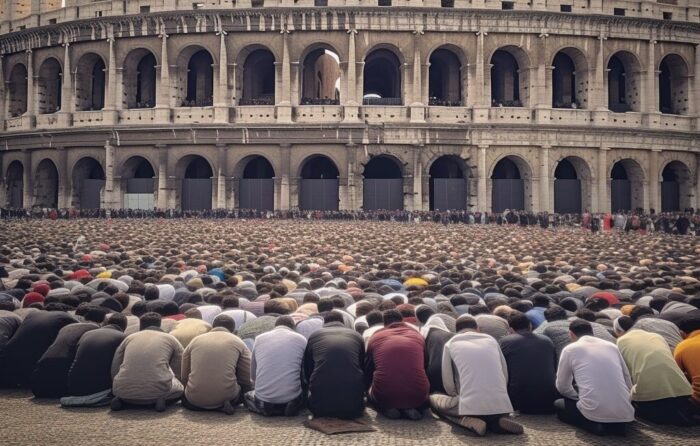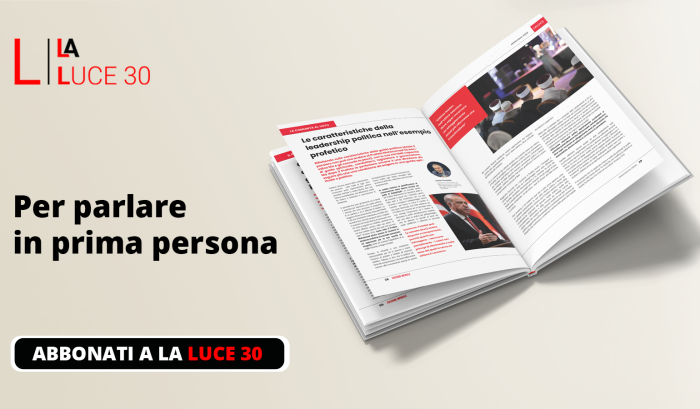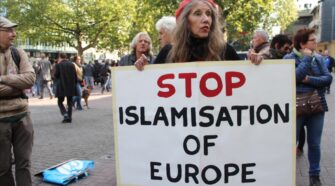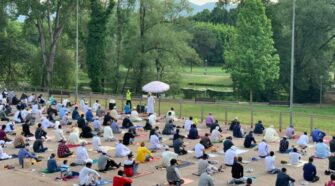On June 7th, the process for the approval of a proposed law targeting Muslims and their places of worship began. The opposition has only shown feeble reactions, and even the Islamic organizations have remained silent. Who is protecting the Muslim worship in Italy?
MP Tommaso Foti, leader of the Brothers of Italy party in the Chamber of Deputies, presented a law proposal that seems more aimed at promoting discrimination against Muslims than actually being approved. Currently, the text is under review by the Commission in the Chamber, where opposition members have raised substantial objections.
However, they have opposed it without looking for media visibility, as they often do when fighting for new rights. Yet, on paper, the freedom of worship is a fundamental and established right, but in practice, it is systematically denied to muslims. The so-called progressives take care not to show themselves as friends of the rights of Muslims, leaving them caught between the opposant of the center-right and the paternalistic of the center-left, without Islamic organizations capable of dealing with these circumstances.
What does the proposed law say?
This proposed law aims to modify the the code that regulates the activity of non-profit associations to prevent Muslims from prayingn their headquarters. This point should disqualify the proposal because in 2023, it is absurd to even consider that prayer, regardless of the religion, requires authorization. People gathering for lawful purposes should not have to ask for permission to pray (every parliamentarian should know this) moreover, if we add that the proposal intends to grant this “authorization” only to those who profess certain religions. This amendment would introduce an exception for religions with agreements with the State.
From the first lines of the report accompanying Foti’s proposal, propagandistic concepts are expressed. It talks about the “lever used by Islamic communities to establish themselves in Italian territory,” as if they were pirates off our coasts who only set foot on land in the presence of mosques. There are no officially recognized mosques, but we have over 2.5 million Muslims permanently residing in Italy for decades, of which at least 1 million have Italian citizenship.
“The Mosque Problem Still Exists”
The achievement of an agreement between religious confessions and the state is not a right; therefore, religious freedom, which is an established right, cannot be subordinate to them. Since they are bilateral agreements, there is no obligation for the parties to compromise, but religious individuals cannot live without praying. In 2016, the Constitutional Court ruled (judgment No. 52) that the government does not have even the duty to start a dialogue with the religious confession for the signing of an agreement (which is the way of concordat for non-Catholic denominations) because it is purely a political act (and it is quite evident that no one would politically find it convenient to make a concordat with Muslims).
However, in the same ruling, the Constitutional Court establishes that religious freedoms must be guaranteed without agreement and for this reason, non-Catholic denominations do not even have the right to initiate negotiations for the bilateral agreement. Unfortunately, alongside the work of the courts, there is a lack of work from political institutions, so the matter is essentially made up of high principles and judgments, unknown to most.
Throughout the history of the Republic (almost 80 years), governments of all colors and all majorities that have succeeded in Parliament have never managed to overcome the Law on Recognized Religions of 1929 (which, let us remember, is a law from the fascist era still in force in our legal system). Especially in matter of construction of places of worship, this law is now useless, and in fact, we have about 1200 “Islamic structures” (as counted and referred to by the Ministry of the Interior, so we are not talking about an underground network).
For the Muslim community there are only two possible choices: to give up congregational ritual prayer (to give up the fundamental right of collective and public practice of worship, recognized by our Constitution and international law) or to risk falling into the gaps of a non-law. There are cases where the organized practice of Islamic prayer “open to the public” (in the absence of the appropriate land use designation for worship) is considered a crime, and individuals may face criminal penalties for building violations.
The European Court of Human Rights will process Italy for this regulatory gray area that inevitably leads to the “crime of prayer,” and a ruling on the case (a 2020 appeal following a prison sentence) could even come during the current legislative term. In the meantime, we have this tribal bill proposal (No. 1018) that exacerbates an already structural problem in our legal system, inevitably affecting other minorities as well (as happened with the sadly known anti-mosque regional laws). Moreover, a similar proposal was previously made by Tommaso Foti, a long-standing member of parliament, during the last legislative term when there were certainly not enough numbers to approve it.
Islamic organizations and the right to worship in international diplomacy
Given that the difference between the center-right and the center-left lies in being declared opponents or non-friends, reaffirming that no political color has ever truly cared about constitutionally oriented religious freedom, which primarily damages Muslims, it remains to be said a few words about how Islamic organizations have reacted to this bill proposal.
Has been no formal reaction from these organizations. However, it should be noted that they are constantly engaged in their respective institutional accreditation procedures (which have recently produced advancements for CoReIs and UCOII). It emerges, therefore, that there is no convergence between the legitimate interests of these organizations and the legitimate right to worship of the people they claim to represent and protect (precisely for worship purposes). So, what can Muslims do?
In the absence of any useful representation for the cause, whether political or confessional, a conscious social network must first be built, which, in cases like this, exercises the obligatory choice of the dispute resolution option in all possible forums, not just Italian ones. Obviously, the case must be raised in the media and also at the international level.
Deputy Prime Minister Antonio Tajani has just appointed a special envoy for the promotion of religious freedom and the protection of Christians worldwide to the Ministry of Foreign Affairs. Perhaps he will begin his mission to some Middle Eastern countries that could ask him to account for the Italian legislation against mosques











